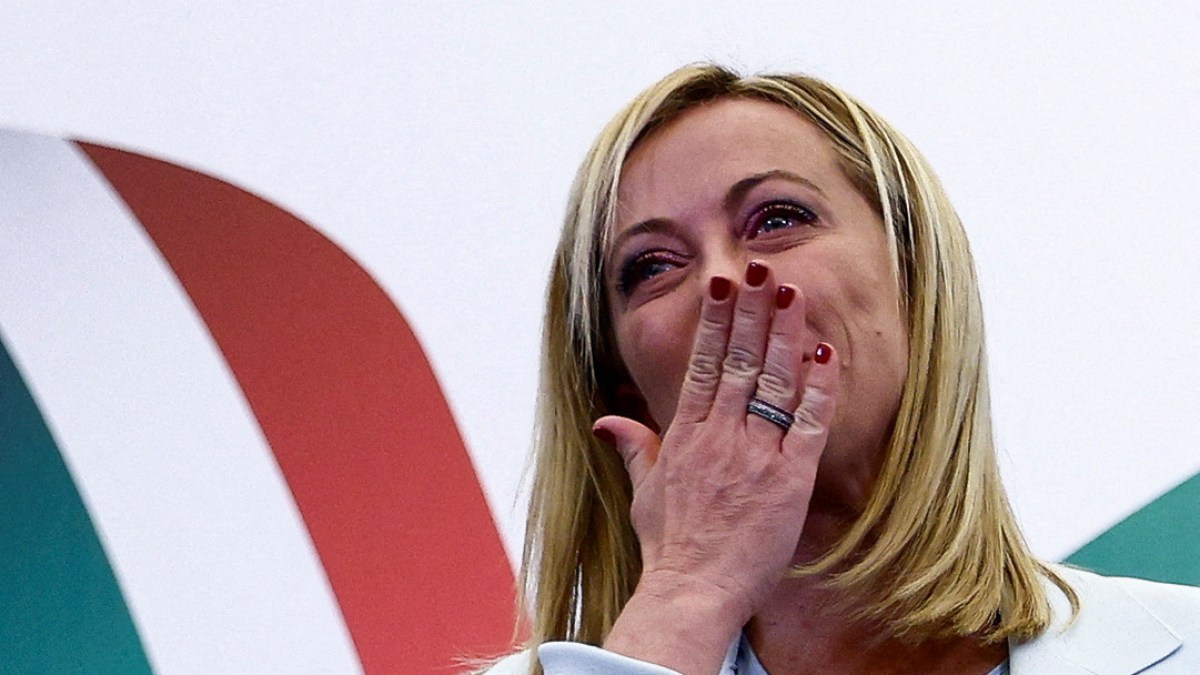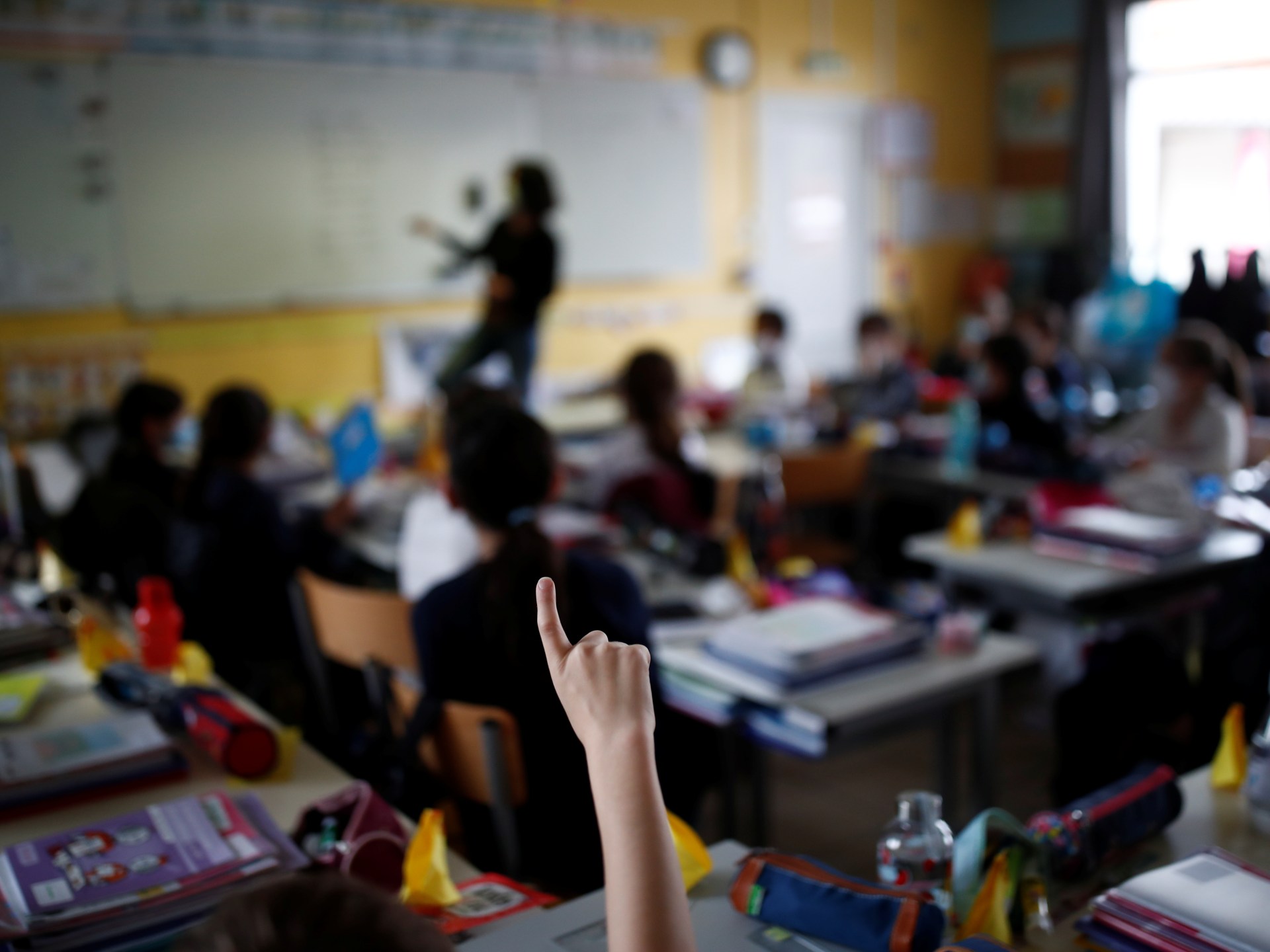No winners in the tragicomic colonial blame game | Emmanuel Macron
A video of Italian Prime Minister Giorgia Meloni denouncing French economic imperialism in Africa, cut from an interview that she gave to Italian TV channel La 7 in January 2019, has recently gone viral, and received much praise, both in Europe and Africa.
In the video, the far-right politician claims that France is using a “colonial currency” – the CFA Franc – to “exploit the resources” of African countries. She then displays a photograph of a Burkinabe child miner, and asserts that “50 percent of everything that Burkina Faso exports”, including the gold the child in the photo “goes down a tunnel to extract”, “ends up in the French treasury”.
Her assertions are not wrong.
France is indeed using the CFA Franc – a currency guaranteed by France and pegged to the Euro – to exert influence over its former colonies in Africa. It guarantees the value of the CFA franc, but in return requires the countries that use it to keep 50 percent of their foreign exchange reserves with the French treasury. This practically removes all monetary sovereignty from these countries, and provides a legal cover for neo-colonial plunder.
But Meloni’s apparent ability to recognise and call out France’s predatory policies towards its former colonies should not trick anyone into believing that she has any true interest in addressing Europe’s continued exploitation of Africa.
After all, Meloni’s own country, Italy, was one of the European colonisers in Africa. It controlled territories in Eritrea, Somalia, Libya and Ethiopia. The devastation the Italian empire caused in Africa, and the many modern-day consequences of this exploitation, are well documented. Nevertheless, Meloni never talks about her own country’s culpability in Africa’s current problems, offers an apology, or calls for reparations.
Furthermore, as a member of the European Union (EU) and its Eurozone, Italy is a beneficiary of the CFA and Europe’s many other exploitative economic policies towards Africa. But Meloni has never proposed an actual policy that would help fix the imbalance of power in the relationship between Europe and Africa. In fact, beyond her efforts to hold French economic imperialism solely responsible for what she perceives as Europe’s migration crisis – as she did in her viral interview with La 7 – Meloni didn’t say much at all on colonial reckoning or neo-colonialism.
It seems for the Italian prime minister, the profound humanitarian consequences of Africa’s colonially induced socioeconomic woes, as epitomised by desperate migrants risking their lives to reach European shores on barely floating dinghies, are nothing but electoral fodder.
In recent years, as discussions on racism and colonialism started to dominate a newly established global public sphere, pointing the finger at other nations’ colonial histories became trendy in the West. Politicians started to try and discredit their political adversaries with accusations of current or historic colonialism, while turning a blind eye to or actively supporting the neo-colonial policies of their own countries.
Indeed, Meloni is hardly the only prominent politician hypocritically using anti-colonial arguments to score points against political rivals. Even French President Emmanuel Macron has jumped on the anti-colonial bandwagon.
On November 20, speaking on the sidelines of a summit of French-speaking nations in Tunisia, Macron tried to defend his country’s continued presence in Africa by pointing the finger at Russia.
“You only have to look at what’s going on in the Central African Republic or elsewhere to see that the Russian project under way there, when France is pushed aside, is a project of predation,” Macron said.
The French leader is right in declaring the Russian project in Africa a project of “predation”. Nevertheless, his attempt to simultaneously present France’s own (much older and much more established) project of predation as benevolent or even beneficiary to Africans can only be described as shameless.
Russia is also participating in this tragicomic colonial blame game. Its leaders seem all too eager to point out that Russia never established colonies in Africa and hence did not commit “bloody crimes of colonialism” like its Western geopolitical rivals.
In July, foreign minister Sergey Lavrov claimed Russia stands “in solidarity with the African demands to complete the process of decolonisation” and ostensibly disengage their economies from adverse European controls.
President Vladimir Putin, meanwhile, speaking at the Valdai Discussion Club’s annual foreign affairs forum in Moscow on October 24, underlined the support Russia provided to African nations during their independence struggles. Explaining his desire for the Western hegemony over other nations to end, he said the West pursues its interests without “giving a thought to the consequences that arise for the African countries”.
Of course, Russia’s ongoing imperial war of aggression in Ukraine alone easily disproves Lavrov and Putin’s loquacious claims about their country’s support for decolonisation, freedom and multi-polarity.
And Russia’s own modern-day engagement with Africa cannot be described as de-colonial either. In fact, Russian agents are readily engaged in colonial-style repression and violence in many African countries.
According to a report released by the Armed Conflict Location & Event Data Project (ACLED) in September, for example, Russia’s Wagner Group (a private mercenary force that is a Kremlin proxy) is engaging “in high levels of civilian targeting” in conflict-ridden CAR and Mali. This politically motivated violence “exceeds the rate of civilian targeting perpetrated by allied state forces, as well as the major insurgent groups operating in each context”. A 2021 UNSC report on Wagner’s activities in CAR had reached the same conclusion. Violations by the Russians and allied government troops “included cases of excessive force, indiscriminate killings, occupation of schools and looting on a large scale, including of humanitarian organizations”, the report said. The Wagner Group has also been accused of exploiting forestry and mining concessions in mineral-rich CAR, Mali and Sudan.
All in all, it is becoming increasingly difficult to spot the difference between Russia’s conduct in Africa and the West’s run-of-the-mill colonial exploitation. Just like France, Russia is also in Africa to expand and defend its geopolitical and economic interests at all costs – it has no real interest in the process of decolonisation.
In the colonial era, those representing imperial powers felt no need to hide the nature of their conduct or pretend to be interested in the wellbeing of the peoples they colonised.
Today, however, we are living in a different world. Being anti-colonial is now trendy. Modern imperialists are thus less forthright about the nature of their country’s conduct in Africa than their predecessors. Many of them, regardless of their actual inclinations, are paying lip service to human rights, and framing their politics and policies as anti-colonial. So much so, they happily accuse each other of neo-colonialism.
Meloni’s criticism of France’s “colonial currency” is accurate. Macron’s criticism of Russia’s “predation project” in Africa is also accurate. And even Lavrov and Putin are not lying when they talk of the West’s “bloody crimes of colonialism”.
But these “hot takes” are not worthy of celebration coming from political leaders who have no interest in critically engaging with their own countries’ neo-colonial policies or taking steps towards building mutually beneficial relationships with African nations.
Everyone, but especially Africans, should refrain from congratulating the likes of Meloni for stating the obvious to further their own imperial agenda.
There are no real winners in the West’s colonial blame game.
The views expressed in this article are the author’s own and do not necessarily reflect Al Jazeera’s editorial stance.




